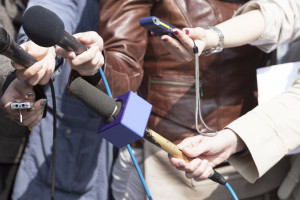 Some of you may be aware of a new case I am handling.
Some of you may be aware of a new case I am handling.
I act for a fellow who had a run-in with some security personnel.
It’s a very interesting case and I’m not the only one who thinks so. It seems to be drawing public interest.
I have been interviewed about the case by representatives of local newspaper and radio outlets.
I have very little experience with the media. I am far more comfortable in the controlled environment of a courtroom.
In a courtroom, the judge makes sure there is not an unfair spin put on the evidence.
This is not a complaint against the media, either in general or with regard to this particular case. But there is no way around the fact that news gets told from the perspective of the teller.
My struggle has been to try to tell the story in as fair and balanced a way as possible. I am hopeful that the justice available to all of us in our system can also be achieved in the public eye.
I may be naive. This posting is not about the specific details of that case, however. It is about biases. I have talked to a few people on a social level since the story came out.
Because I don’t have a name tag saying I’m the Paul Hergott acting for the guy in the news, they had no idea I am intimately involved in the case.
I have found that there has been a common assumption that the fellow must have done something to deserve what he got. He must have done something to deserve having been man-handled and pinned on the floor for several minutes. I suggest that the common assumption arises from a common bias.
It feels uncomfortable to think that bad things could happen to us through no fault of our own.
It feels more comfortable to assume that this fellow “asked” for it or somehow deserved what may turn out to be permanent injuries, than to accept the possibility that the very same thing could happen to you or someone you care about.
I have to deal with that same bias every time I gear up to prosecute a car crash claim. There is a tendency in a jury to try to find some fault in the injured claimant.
It helps distance the individual jurors from the possibility that this same unfortunate fate might happen to them.
There is a classic illustration of this bias. A man drives to work at exactly the same time, taking exactly the same route, for years. One day, he sleeps in. He is running late. He takes a slightly different route to shave a minute or two off the trip’s time.
After years without ever having been in a car crash, this man is rendered a quadriplegic when another driver blows a stop sign and broadsides his car.
What jumps to your mind? If you are like most people, you are thinking that if he hadn’t slept in that day, or if he hadn’t taken a different route, the outcome could have been different.
If so, you are attaching some responsibility to this tragic, fictional fellow.
Perhaps the first thing jumping to your mind should be if only that idiot hadn’t blown through that stop sign. This bias is one of the reasons why the presumption of innocence is so critical in our criminal justice system.
It is hoped that this presumption will dispel the bias that the accused must be guilty just because he or she was arrested and jailed by the police.
That bias has earned more than one innocent person a life sentence. And that has also sent more than one innocent person to death row in countries where the death penalty still exists.
If we do not recognize our biases, we cannot work to change them. It’s important always to think critically and not allow yourself to be misled by unfair assumptions.
Published April 20, 2008 in the Kelowna Capital News

0 Comments